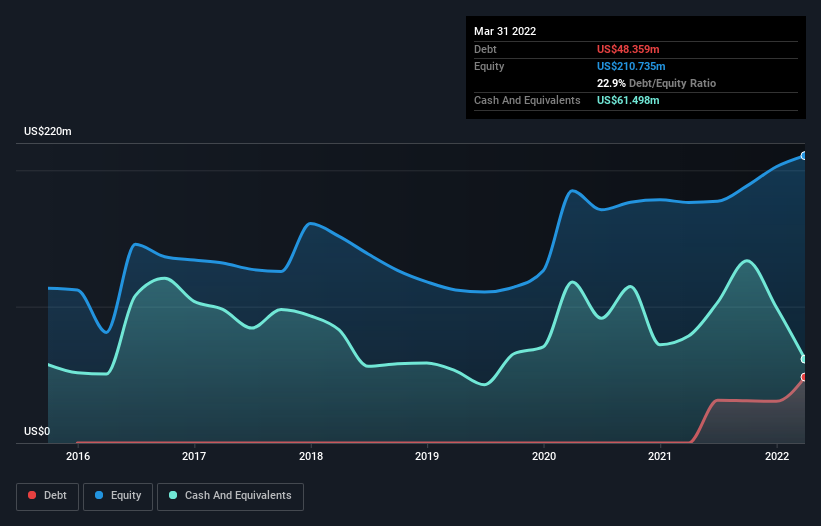Here's Why Universal Technical Institute (NYSE:UTI) Has A Meaningful Debt Burden
Howard Marks put it nicely when he said that, rather than worrying about share price volatility, 'The possibility of permanent loss is the risk I worry about... and every practical investor I know worries about.' It's only natural to consider a company's balance sheet when you examine how risky it is, since debt is often involved when a business collapses. As with many other companies Universal Technical Institute, Inc. (NYSE:UTI) makes use of debt. But the more important question is: how much risk is that debt creating?
What Risk Does Debt Bring?
Generally speaking, debt only becomes a real problem when a company can't easily pay it off, either by raising capital or with its own cash flow. If things get really bad, the lenders can take control of the business. However, a more common (but still painful) scenario is that it has to raise new equity capital at a low price, thus permanently diluting shareholders. Of course, the upside of debt is that it often represents cheap capital, especially when it replaces dilution in a company with the ability to reinvest at high rates of return. When we think about a company's use of debt, we first look at cash and debt together.
See our latest analysis for Universal Technical Institute
What Is Universal Technical Institute's Net Debt?
You can click the graphic below for the historical numbers, but it shows that as of March 2022 Universal Technical Institute had US$48.4m of debt, an increase on none, over one year. But on the other hand it also has US$61.5m in cash, leading to a US$13.1m net cash position.
A Look At Universal Technical Institute's Liabilities
According to the last reported balance sheet, Universal Technical Institute had liabilities of US$118.4m due within 12 months, and liabilities of US$188.3m due beyond 12 months. On the other hand, it had cash of US$61.5m and US$21.0m worth of receivables due within a year. So its liabilities outweigh the sum of its cash and (near-term) receivables by US$224.1m.
This is a mountain of leverage relative to its market capitalization of US$239.9m. Should its lenders demand that it shore up the balance sheet, shareholders would likely face severe dilution. Despite its noteworthy liabilities, Universal Technical Institute boasts net cash, so it's fair to say it does not have a heavy debt load!
Although Universal Technical Institute made a loss at the EBIT level, last year, it was also good to see that it generated US$34m in EBIT over the last twelve months. The balance sheet is clearly the area to focus on when you are analysing debt. But it is future earnings, more than anything, that will determine Universal Technical Institute's ability to maintain a healthy balance sheet going forward. So if you're focused on the future you can check out this free report showing analyst profit forecasts.
Finally, a company can only pay off debt with cold hard cash, not accounting profits. Universal Technical Institute may have net cash on the balance sheet, but it is still interesting to look at how well the business converts its earnings before interest and tax (EBIT) to free cash flow, because that will influence both its need for, and its capacity to manage debt. During the last year, Universal Technical Institute burned a lot of cash. While investors are no doubt expecting a reversal of that situation in due course, it clearly does mean its use of debt is more risky.
Summing up
While Universal Technical Institute does have more liabilities than liquid assets, it also has net cash of US$13.1m. So while Universal Technical Institute does not have a great balance sheet, it's certainly not too bad. There's no doubt that we learn most about debt from the balance sheet. But ultimately, every company can contain risks that exist outside of the balance sheet. Case in point: We've spotted 3 warning signs for Universal Technical Institute you should be aware of, and 1 of them is significant.
If, after all that, you're more interested in a fast growing company with a rock-solid balance sheet, then check out our list of net cash growth stocks without delay.
Have feedback on this article? Concerned about the content? Get in touch with us directly. Alternatively, email editorial-team (at) simplywallst.com.
This article by Simply Wall St is general in nature. We provide commentary based on historical data and analyst forecasts only using an unbiased methodology and our articles are not intended to be financial advice. It does not constitute a recommendation to buy or sell any stock, and does not take account of your objectives, or your financial situation. We aim to bring you long-term focused analysis driven by fundamental data. Note that our analysis may not factor in the latest price-sensitive company announcements or qualitative material. Simply Wall St has no position in any stocks mentioned.



